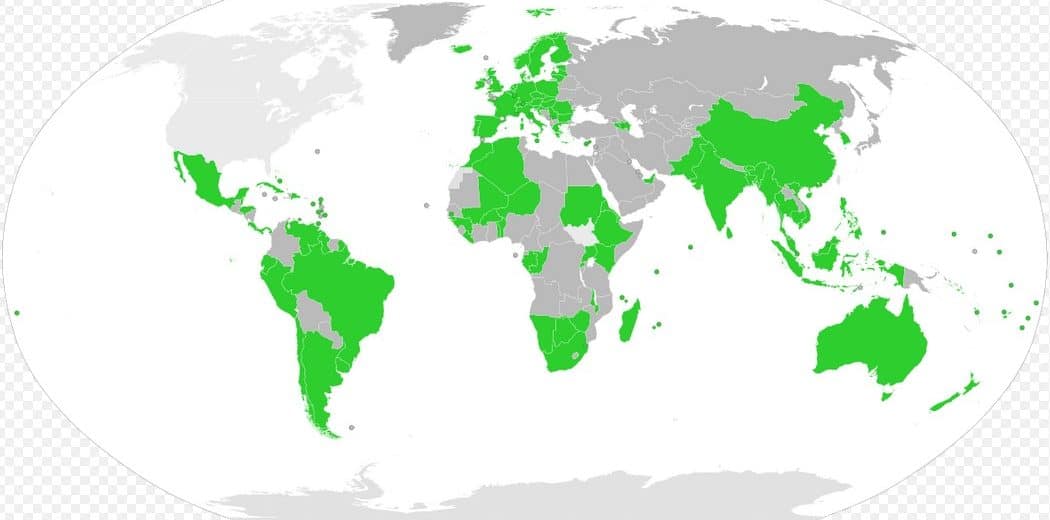
The UK is now committed, through the Kyoto Protocol, to a 12% reduction in greenhouse gas emissions by 2008 to 2012 from 1990 levels. The UK Programme of CO2 emission reduction furthermore aims to reduce CO2 emissions by 20% by 2010. Recent energy projections (Dti, 1995) show that the UK is confident of meeting the original commitment of the Framework Convention for a stabilisation in CO2 emissions by 2000, and may exceed it by between 6 and 13 MtC below 1990 levels.
Despite the Kyoto Protocol however, emission reductions of the magnitude shown in Table 6.9 have not yet established themselves on the global or national political agenda. Yet it seems that without more stringent targets for emission reductions, the world will be unable to avert a climate change more rapid than anything that has occurred during geologic time.
Despite current scientific uncertainties regarding the causal link between increased greenhouse gases and a rise in global temperature, it seems probable that current FCCC commitments are at odds with its own underlying objective, to prevent dangerous anthropogenic interference with the climate system in a time-frame sufficient to allow natural ecosystems to adapt.
Although the FCCC aims to be precautionary in nature, just what is required by global policy to prevent dangerous anthropogenic interference with the climate system is far from clear. Comparison of temperature changes observed in the natural analogue, as indicated above, provide a starting framework. Nevertheless, the whole issue of the precautionary principle is at present, poorly defined (O’Riordan & Jordan, 1995). Most usually, it is interpreted to mean the implementation of action to prevent interference with the global climate in spite of scientific uncertainty (Article 3.3, UNEP, 1992). Included within this definition are the ideas of cost-effectiveness and responsibility.
Assigning a monetary (and indeed a moral) value to the impacts of global warming is fraught with the difficulties of ethical subjectivism (Buchdahl, 1997). Turner (1995), and O’Riordan & Jordan (1995) have offered some sort of framework, distinguishing between the weak and strong precautionary standpoints of traditional economists and contemporary environmental analysts respectively. Such plurality of opinion depends to a large extent on differing views on the vulnerability or resilience of the global climate. All parties call for scientific evidence to back up their respective arguments. Ironically, as much of this chapter has illustrated, the greatest scientific uncertainty in climate change prediction is this climate sensitivity or vulnerability to the change in radiative forcing associated with a build up of greenhouse gases. Although the essence of the precautionary principle is its call for preventative action, in spite of existing scientific uncertainty, it paradoxically seems that the very success of the FCCC rests on finding a better understanding of the climate system.
The issue of responsibility for global warming may prove to be even more of a contentious issue as nations try to agree on strategies to protect the global climate. Ultimately, it is not clear how the burden of responsibility should be shared amongst the parties of the FCCC. Article 4.2a of the FCCC recognised the different economic starting points of nations to be considered when drawing up national CO2 reduction strategies. However, should developed nations, such as the UK, be required to shoulder more of the burden of CO2 emission reduction, in light of their substantially greater energy expenditure, present, past and future? Equally, can developing nations reasonably be expected to stabilise or reduce their greenhouse gas emissions to the detriment of their fledgling economies?
Many developing nations regard the developed world as the cause of the global warming problem. Before developing nations attempt to reduce emissions, developed countries, they argue, should implement their own effective reduction strategies. Some see the concept of joint implementation (UNEP, 1992) as a workable solution, but here again, poorer states view this as ineffective at mitigating the threat of climate change.
Perhaps what is really at issue here, and is often conveniently overlooked, is that developing nations, whilst being only minor contributors to the global warming problem at present, are most likely to suffer the severest impacts resulting from any future climate change.
To date, the instruments for achieving policy goals have been solely advisory, as nations have shied away from using legislative measures to implement greenhouse gas emission reductions. This piecemeal approach to climate change abatement could shift the burden of responsibility on to those less able to manage the task (Buchdahl et al., 1995). Clearly, the issue for a nation state is providing the maximum environmental protection commensurate with political acceptability. In the case of the UK the level of acceptable carbon abatement has been defined through a comprehensive consultation process which identified the target reductions, the instruments to achieve these targets and the sectors in which instruments could be deployed with the greatest cost effectiveness and maximum efficiency.




Leave a Reply